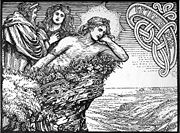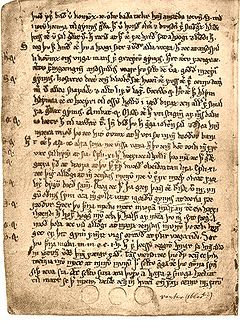
Skírnismál
Encyclopedia

Poetic Edda
The Poetic Edda is a collection of Old Norse poems primarily preserved in the Icelandic mediaeval manuscript Codex Regius. Along with Snorri Sturluson's Prose Edda, the Poetic Edda is the most important extant source on Norse mythology and Germanic heroic legends, and from the early 19th century...
. It is preserved in the 13th century manuscripts Codex Regius
Codex Regius
Cōdex Rēgius is an Icelandic manuscript in which the Poetic Edda is preserved. It is made up of 45 vellum leaves, thought to have been written in the 1270s. It originally contained a further 8 leaves, which are now missing...
and AM 748 I 4to
AM 748 I 4to
AM 748 I 4to is an Icelandic vellum manuscript fragment containing several Eddaic poems. It dates to the beginning of the 14th century. The six sheets which have been preserved contain the following poems, all mythological.*Grímnismál...
but may have been originally composed in heathen
Norse paganism
Norse paganism is the religious traditions of the Norsemen, a Germanic people living in the Nordic countries. Norse paganism is therefore a subset of Germanic paganism, which was practiced in the lands inhabited by the Germanic tribes across most of Northern and Central Europe in the Viking Age...
times. Many scholars believe that the poem was acted out, perhaps in a sort of hiéros gamos
Hieros gamos
Hieros gamos or Hierogamy refers to a sexual ritual that plays out a marriage between a god and a goddess, especially when enacted in a symbolic ritual where human participants represent the deities. It is the harmonization of opposites...
.
Synopsis

Freyr
Freyr is one of the most important gods of Norse paganism. Freyr was highly associated with farming, weather and, as a phallic fertility god, Freyr "bestows peace and pleasure on mortals"...
, the son of Njörðr, sits in Odin
Odin
Odin is a major god in Norse mythology and the ruler of Asgard. Homologous with the Anglo-Saxon "Wōden" and the Old High German "Wotan", the name is descended from Proto-Germanic "*Wodanaz" or "*Wōđanaz"....
's throne, Hliðskjálf
Hliðskjálf
Hliðskjálf is an album by Norwegian black metal solo project Burzum. This album was the second to be recorded by Varg Vikernes while he was imprisoned for murder and arson. Dauði Baldrs and Hliðskjálf were created with synthesized instruments as he was not allowed any other instruments while being...
and looked over all the worlds. On looking to Jötunheimr
Jötunheimr
Jötunheimr is one of the Nine Worlds and the homeland of the Giants of Norse Mythology — Rock Giants and Frost Giants.-Legend:...
, the land of the giants, Freyr sees a beautiful girl and is immediately seized by love. Fearing that the object of his heart's desire is unattainable, gloom settles upon him.
The poem itself starts with the wife of Njörðr, bidding Skírnir to ask of Freyr why he is so sad. Skírnir, fearing his master's wrath, nevertheless does as he is bidden. Freyr's response is sullen, yet he pours his heart out. Skírnir agrees to undertake a journey to woo Gerðr, and Freyr furnishes him with his magical steed and sword.
Skírnir duly fetches up in Jötunheimr, at the hall of the giant Gymir
Gymir
In Norse mythology, Gymir was a giant whose daughter, Gerðr, married the god Freyr.According to the Eddic poems Skírnismál and Hyndluljóð, Gymir and his wife Aurboða are Gerð's parents...
. Gerðr, the daughter of Gymir bids him enter the hall; without further ado, Skírnir tries to woo Gerðr on Freyr's behalf, offering first gifts then threats. Eventually, Gerðr succumbs. Skírnir reports to Freyr, who asks him:
- Tell me, Skírnir, before unsaddling
- Or stepping forth another pace
- Is the news you bring from Jotunheim
- For better or for worse?
Skírnir replies:
- In the woods of Barri, which know we both so well,
- A quiet still and tranquil place
- In nine nights time to Njörd's son
- Will Gerd give herself.
Freyr responds:
- One night is long enough, yet longer still are two;
- How then shall I contend with three?
- For months have passed more quickly
- Than half a bridal eve.
Later, Skírnir
Skirnir
In Norse mythology, Skírnir is the god Freyr's messenger and vassal. In the Poetic Edda poem Skírnismál, Skírnir is sent as a messenger to Jötunheimr to conduct Freyr's wooing of the fair Gerðr on condition of being given Freyr's sword as a reward. Skírnir also threatens Gerðr with his gambantein,...
speaks to Gerd
Gerd
In Norse mythology, Gerðr is a jötunn, goddess, and the wife of the god Freyr. Gerðr is attested in the Poetic Edda, compiled in the 13th century from earlier traditional sources; the Prose Edda and Heimskringla, written in the 13th century by Snorri Sturluson; and in the poetry of skalds...
:
- Seest thou, maiden, this keen, bright sword
- That I hold here in my hand?
- Before its blade the old giant bends,—
- Thy father is doomed to die.
- I strike thee, maid, with my gambanteinGambanteinIn Norse mythology, Gambanteinn appears in two poems in the Poetic Edda.-Hárbarðsljóð:In Hárbarðsljóð stanza 20, Hárbarðr says:A giant hard was Hlébard, methinks:...
, - To tame thee to work my will;
- There shalt thou go where never again
- The sons of men shall see thee.
Translations
- Skirnismol Henry A. Bellows' translation and commentary
- För Skírnis eðr Skírnismál Benjamin Thorpe's translation
- Skirnismal Lee M. Hollander's translation
- Skírnismál Bellows' translation with clickable names
- Journey of Skirner A. S. Cottle's translation
- The Lay of Skirnir Translation by W. H. AudenW. H. AudenWystan Hugh Auden , who published as W. H. Auden, was an Anglo-American poet,The first definition of "Anglo-American" in the OED is: "Of, belonging to, or involving both England and America." See also the definition "English in origin or birth, American by settlement or citizenship" in See also...
and P. B. Taylor
Editions
- Skírnismál Sophus BuggeSophus BuggeSophus Bugge was a noted Norwegian philologist and linguist. His scientific work was directed to the study of runic inscriptions and Norse philology. Bugge is best known for his theories and his work on the runic alphabet and the Poetic Edda and Prose Edda. -Background:Elseus Sophus Bugge was...
's edition - Skírnismál Guðni Jónsson's edition
Scholarship
- Skírnismál as Ritual Drama Article by Rick McGregor
- The Elder Edda and Ancient Scandinavian Drama Book by Bertha S. PhillpottsBertha PhillpottsDame Bertha Surtees Phillpotts was an English scholar in Scandinavian languages, literature, history, archaeology and anthropology.-Biography:...
- http://userpage.fu-berlin.de/~alvismal/6skm.pdf Heinz Klingenberg, "För Skírnis: Brautwerbungsfahrt eines Werbungshelfers," Alvíssmál 6 (1996): 21–62 (see English summary, pp. 59–62).
- http://userpage.fu-berlin.de/~alvismal/6klaus.pdf Anatoly Liberman, Review of Klaus von See et al., "Skírnismál": Modell eines Edda-Kommentars, Alvíssmál 6 (1996): 114–18.
- http://userpage.fu-berlin.de/~alvismal/7amor.pdf Anne Heinrichs, "Der liebeskranke Freyr, euhemeristisch entmythisiert," Alvíssmál 7 (1997): 3–36 (see English summary, p. 36).

